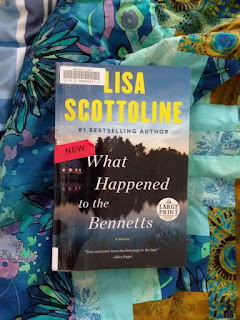What Happened to the Bennetts?
Adult chiller
"I glanced in my rearview mirror at the pickup truck, which was
riding my bumper. I hated tailgaters, especially with my family in
the car, but nothing could ruin my good mood. My daughter's field
hockey team had just beat Radnor, and Allison had scored a goal..."
It's a scene as quintessentially 21st century middle class as
Norman Rockwell paintings were for 20th century small town America.
Mom (Lucinda), Dad (Jason), two kids (Ethan and Allison), and family
dog returning home from a child's athletic triumph. Many of you have
experienced such precious moments. But don't say awww just yet.
Things are about to go downhill fast and furiously. Lisa Scottoline,
queen of chillers transpiring in quotidian settings, is in the
author's seat.
Sure enough the tailgating black pickup pulls in front of the
family car, blocking their way. Two men with guns tell the family to
exit their vehicle. The dog, Moonie, panics and jumps. A gun goes
off. Allison is shot in the neck.
Then seemingly out of the blue one of the carjackers shoots the
other.
The death of their beautiful daughter and sister is only the
first loss in store for the Bennetts. After returning home from the
hospital they get a visit from FBI agents. Allison's killer and his
accomplice are members of a criminal drug syndicate. The dead bad guy
is the son of the head of the syndicate who has probably been told
that Jason shot his son. It's likely they will target Jason and his
family.
The remaining family has to enter the witness protection
program. After being given fifteen minutes to pack they are driven to
a remote location where they are in the protective custody of two
agents. They can't contact any family and friends, not even Lucinda's
fragile mother who is a nursing home resident. They can't attend
Allison's funeral. They can't post information on social media even
as they see speculation that the family's disappearance is due to
murder and possibly suicide on Jason's part.
Only not all that the FBI agents tell him adds up in Jason's
mind. Maybe they aren't being given the truth. Maybe their
protectors aren't people they can trust.
Ultimately Jason decides he must find his own solution to the
crisis even though it involves taking on the syndicate on his own.
Scottoline does what she does best in this impossible to put
down chiller. She takes people readers can easily relate to, puts
them in an untenable situation, and builds the action to an almost
unbearable crescendo. If you're one of her many fans or an
affecianado of the genre put What Happened to the Bennetts on your
beach read list. You do not want to read it home alone after darkness
falls.
On a purrrsonal note, today Diane gave me a ride to the redemption
center to cash in $41.05 worth of Tobago's bottles and cans. I saw a
poster there that showed me how right I am at working so dilligently
to build up Tobago's savings account. A poor rescue dog named Zeus is
suffering while his people are trying to pull together enough for an
operation he needs that will cost two to three thousand dollars. I am
determined that if Tobago needs an operation I'll have the money for
it. Or at least most of the money. The people who love her would
help too if necessary. (Jules)
My people are taking care of me. (Tobago)
A great big shout out goes out to all who help animals get the medical
care they need so they don't have to suffer or die too young.
Tobago and Jules Hathaway
Sent from my iPod








